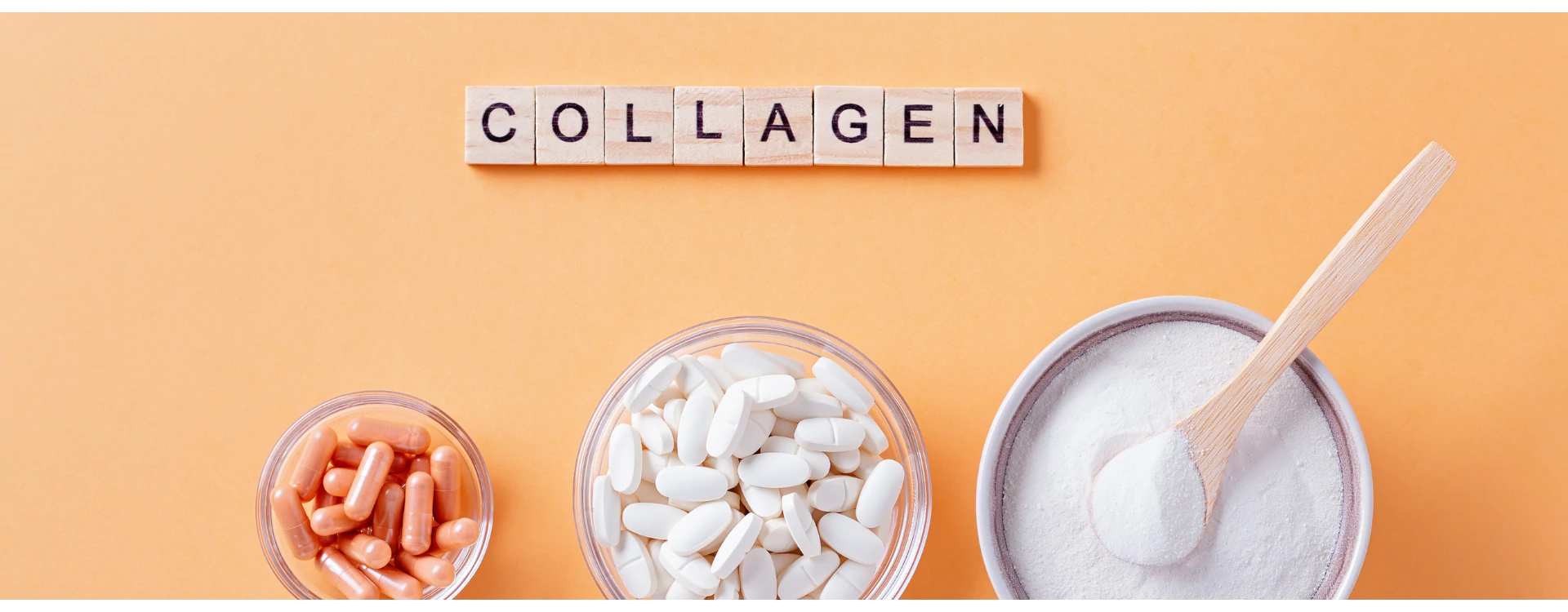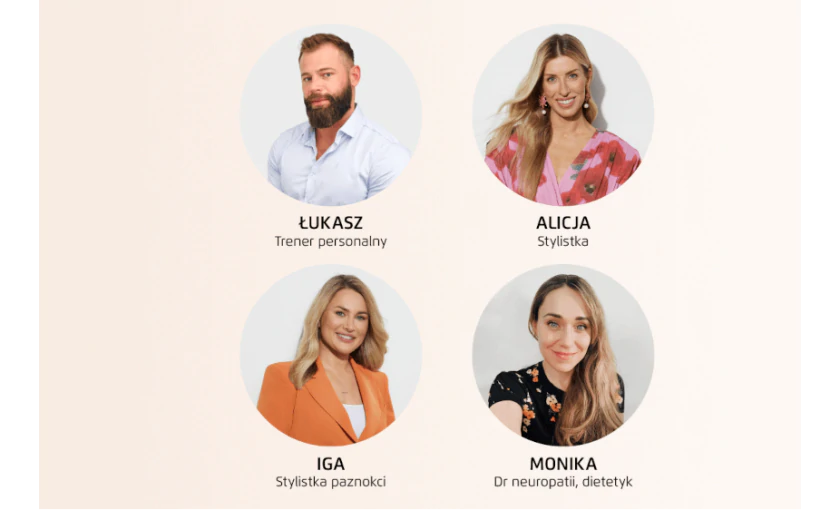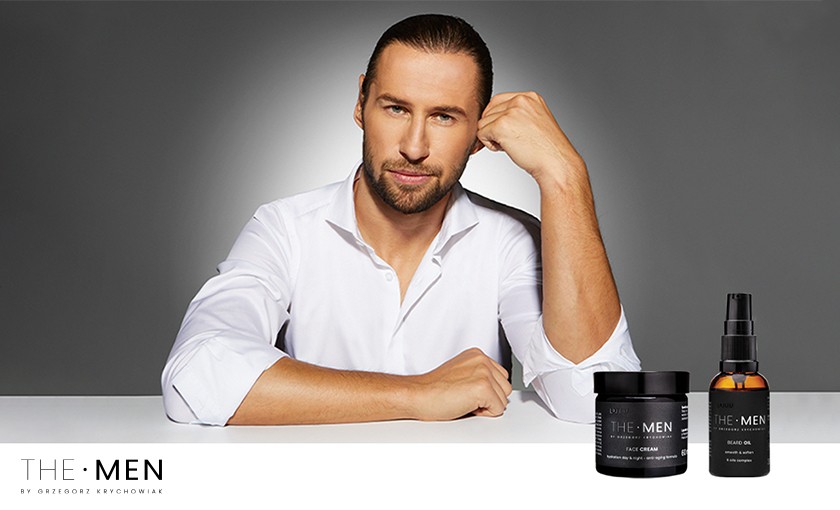Collagen is a protein that has been talked about extremely often for a long time. Once in the context of joint and bone health, nowadays - with an eye on skin, hair and nail health. The truth is, however, that collagen is extremely versatile, and can make a difference in making life more comfortable, and in many ways. And while supplementing collagen is a good thing, it's also worth ensuring that our bodies synthesize as much of it as possible, and that our diet or lifestyle... doesn't damage this protein. What undermines natural collagen production? We will try to answer these questions as best we can.
What inhibits collagen production - a list:
We have a really long list for you. Here are the factors that affect collagen loss:
- Aging
- UV radiation
- Smoking
- Excessive alcohol consumption
- Oxidative stress
- Air pollution
- Excessive sugar in the diet
- Deficiency of vitamins and minerals
- Lack of physical activity
- Chronic stress
- Hormonal disorders
What contributes to the breakdown of collagen? Really many factors that are related to our diet, lifestyle, inadequate care. Fortunately, they are not difficult to combat. However, it is worth finding out why exactly these actions negatively affect
collagen in the body.
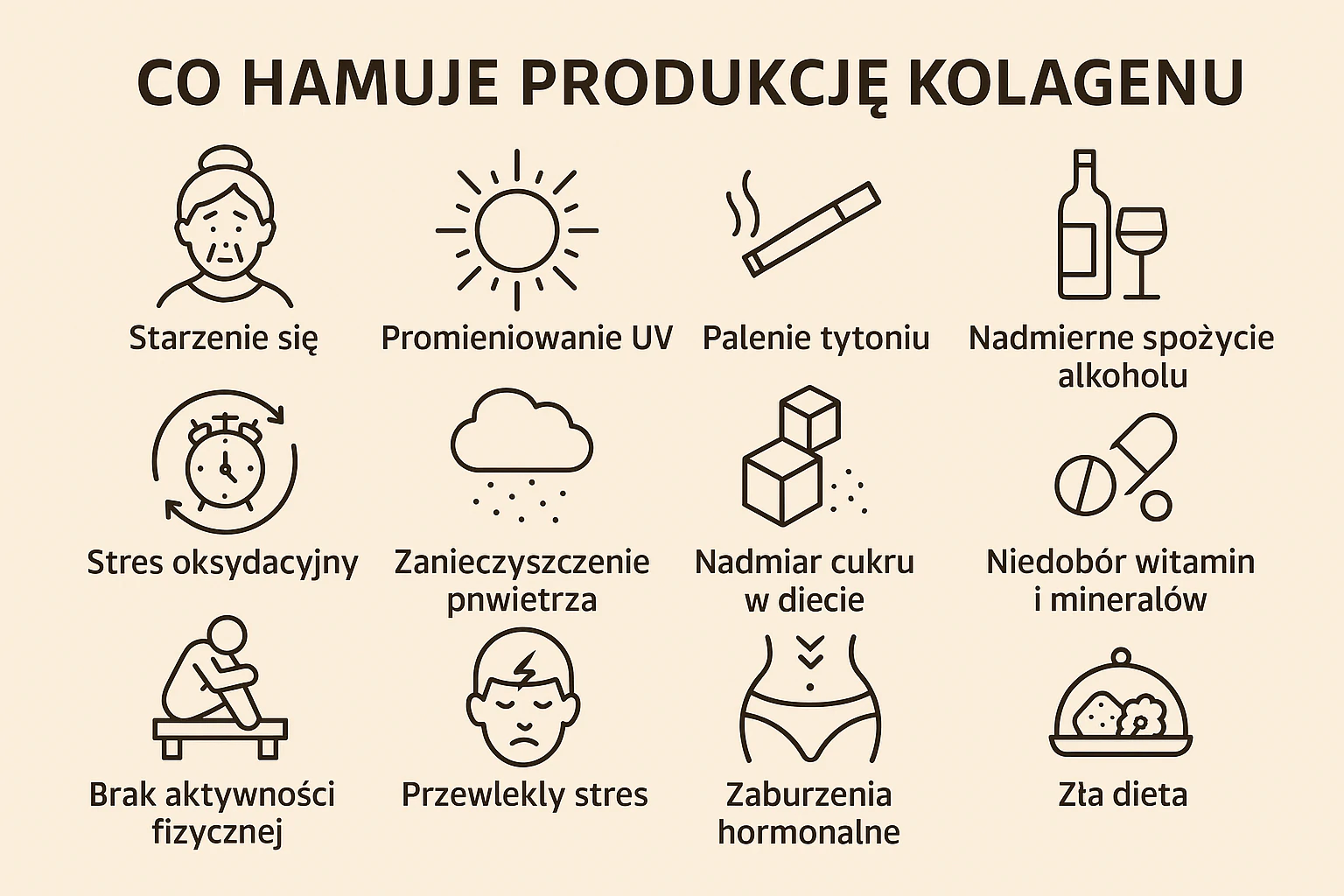
What leads to collagen degradation? Aging
Aging is a natural process that cannot be fought. It can be delayed, but still, over time, collagen production in the body will decline. After the age of 25, collagen synthesis declines, and by the age of 60 it can be up to half that of youth. That's when it's not difficult to experience symptoms of collagen deficiency - wrinkles, less firm skin, aching joints. However, it is important to remember that although aging is a natural factor in the decline of collagen in the body, our decisions affect how much we lose this protein. The causes of collagen destruction are various, and by leveling them, we can positively influence the natural processes, significantly delaying them.
UV radiation and collagen destruction
Exposure to UV radiation is a factor that destroys collagen in the skin, and to a significant degree. Why? Because UV damages collagen fibers by generating free radicals. These damage many cells, including the skin and the structures in which collagen is formed. If you want to positively affect your body's collagen levels, ward off prolonged sun exposure, shield yourself from the sun and, of course, use high sunscreens.
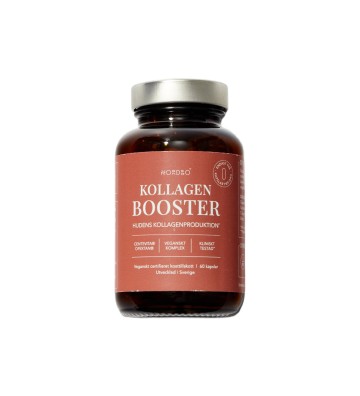 Skin, Hair, Nails
Skin, Hair, Nails
-20%
Collagen Booster
Regular price
215.00 zł
Price
172.00 zł
The lowest price in the 30-day period before the reduction: 172.00 zł
2.87 zł / Unit
Availability: 12 In Stock
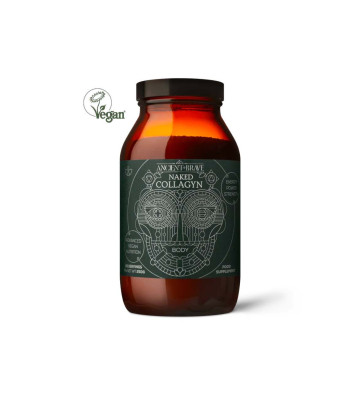 Skin, Hair, Nails
Skin, Hair, Nails
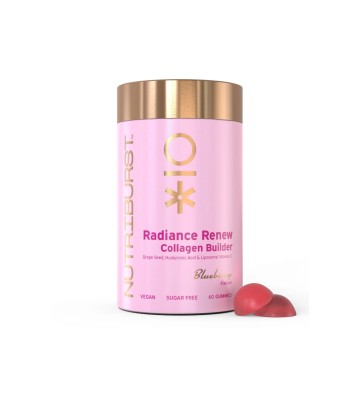 Skin, Hair, Nails
Skin, Hair, Nails
-10%
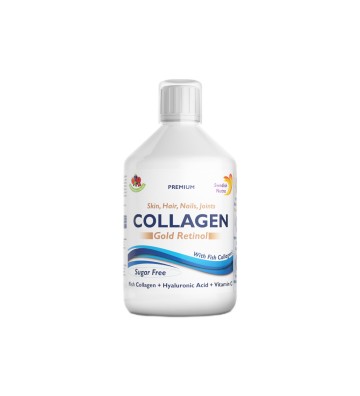 Collagen
Collagen
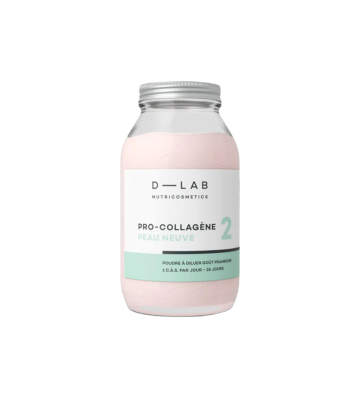 Firming
Firming
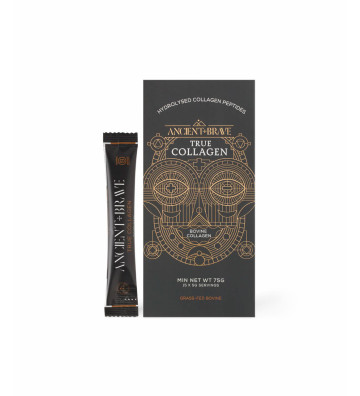 Skin, Hair, Nails
Skin, Hair, Nails
Collagen-damaging substances
We can point to several substances that affect collagen damage. These are primarily tobacco, which has a harmful effect not only on the lungs, teeth, but also on the skin. He is also responsible for increasing the presence of free radicals in the body. These, in turn, damage proteins such as collagen and elastin. In addition, tobacco reduces blood flow in the skin, which means that oxygen and nutrients can't get to the cells. These are malnourished and slowly lose strength. But cigarette smoking is not the only way to damage collagen fibers. Alcohol also helps with this. He, too, causes oxidative stress and inflammation, which contribute to collagen degradation. And next to tobacco and alcohol is another stimulant we often forget about. It is sugar. Its excess in the diet leads to the glycation process, which causes the main support proteins in the skin - collagen and elastin - to lose strength and elasticity [1]. This doesn't mean you have to shun sugar like fire. But it's good to know moderation and remember that snacking and sweets usually don't lead to anything good.
Chronic stress, lack of sleep, and collagen
It is said that anger harms beauty, but the truth is that it is rather stress that harms it. Or more precisely - high levels of cortisol and adrenaline. These hormones destroy collagen and reduce oxygen transport to cells, just like tobacco. In addition, stress also leads to (or exacerbates) other skin problems. It can cause acne, psoriasis or eczema. Therefore, reducing stress is a good way to positively affect the presence of this protein in the skin. In addition, stress reduction also means better, more restorative sleep. Why are we writing about it? Because not getting enough sleep also increases cortisol levels, inhibits the function of fibroblasts responsible for collagen production, increases oxidative stress, and consequently accelerates skin aging. Interestingly, studies show that good quality sleep can enhance the benefits of collagen supplementation
[2].
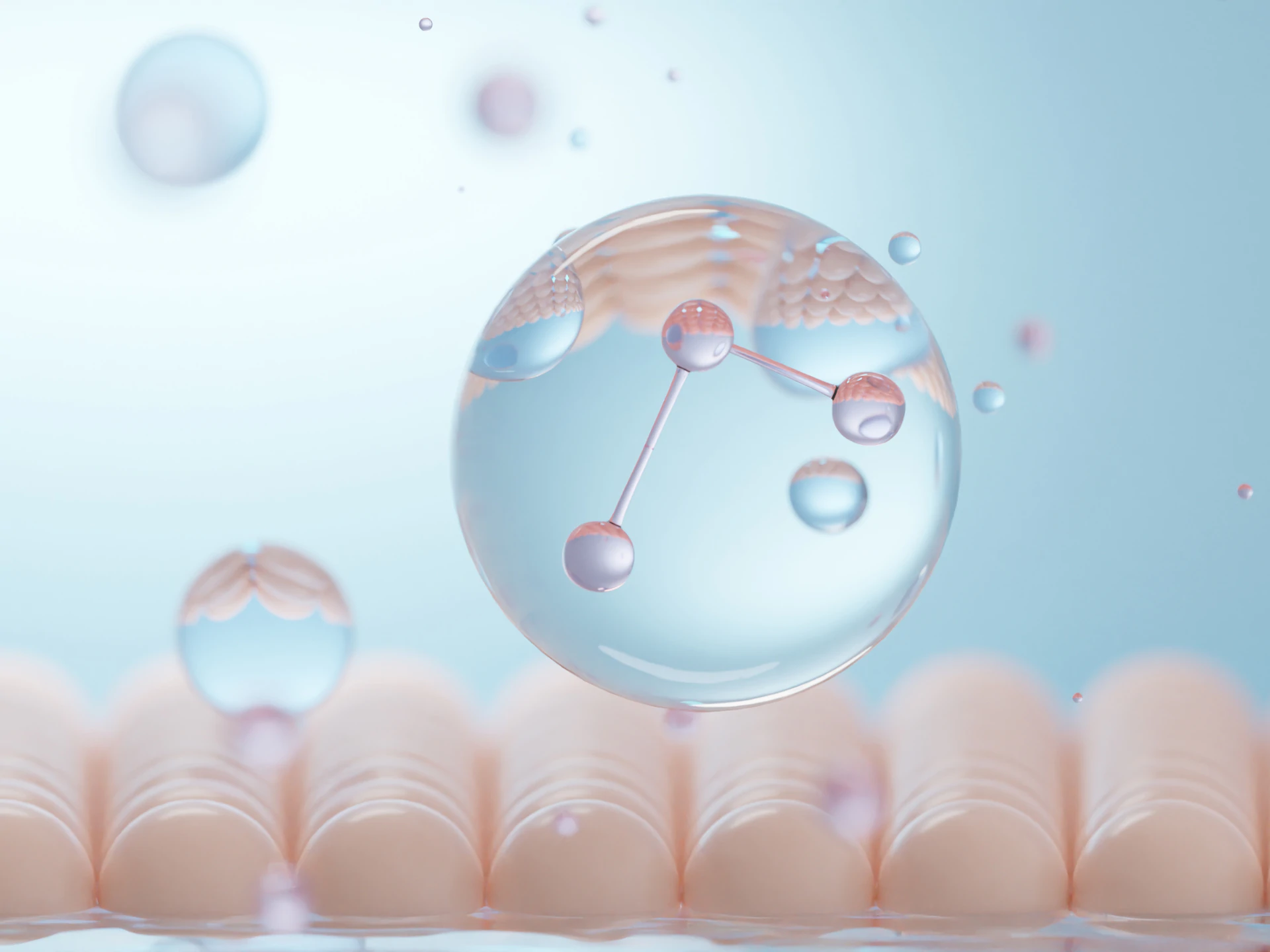
Vitamin and mineral deficiencies and collagen
We are well aware that collagen is formed with the help of vitamins and minerals supplied with food or supplements. Therefore, naturally, the lack of adequate amounts of vitamin C, but also vitamin E, copper, zinc, iron and sulfur, can lead to a decrease in collagen production. It is then worth reaching for the right supplements or
vegan collagen, which is geared to support the body in creating this protein. Of course, a healthy diet rich in vitamins and minerals is also essential here.
How to replenish collagen deficiencies?
In addition to following a diet rich in protein, vitamins and minerals, and limiting sugar and stimulants, it is also worth consuming products that are themselves rich in collagen. These include bone broths, offal, gelatin-based jellies and fish with skin. If such a diet seems too meaty for you, you may want to consider collagen supplementation. Your main choices are:
- Fish collagen - for vegetarians and people who care primarily about skin health. You can also choose marine collagen, of even higher quality.
- Beef collagen - especially with bone and joint health in mind. Not infrequently referred to as collagen for men, but can be used by both men and women.
You can find it in liquid, powder or tablets, and even gels.
In addition to supplementation, also make sure to get enough sleep, reduce stress and get regular physical activity, which stimulates collagen production.
Remember, however, that the process of collagen replenishment takes time and consistency. However, you can calmly affect your health if you actually exclude from your diet and lifestyle those factors that can destroy collagen.
Source


